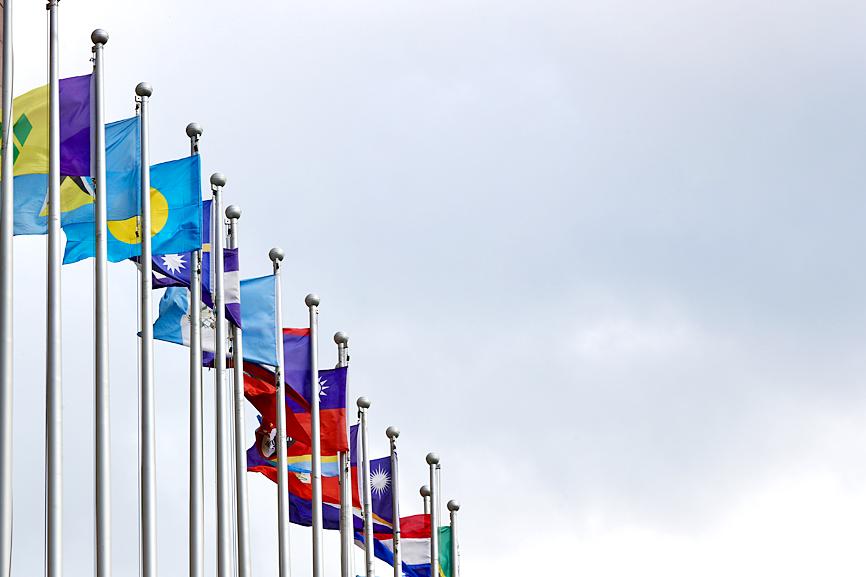Taiwan severed diplomatic ties with Nicaragua shortly after the Central American nation on Thursday switched recognition to China, the Ministry of Foreign Affairs said yesterday.
Taiwan recalled staff from its embassy and technical mission after Nicaraguan President Daniel Ortega’s administration announced that it would only recognize China, the ministry said.
“The People’s Republic of China [PRC] is the only legitimate government that represents all China, and Taiwan is an inalienable part of the Chinese territory,” the Nicaraguan government said in a statement. “As of today, Nicaragua breaks its diplomatic relations with Taiwan and ceases to have any official contact or relationship.”

Photo: Ritchie B. Tongo, EPA-EFE
Although Nicaragua’s diplomatic switch leaves Taiwan with just 14 diplomatic allies, it comes as Taipei bolsters ties with multiple unofficial Western friends, including the US.
The ministry said that Taiwan “deeply regrets” that the Nicaraguan government has disregarded the friendship between Taiwanese and Nicaraguans.
“To safeguard national sovereignty and dignity, Taiwan has decided to terminate diplomatic relations with Nicaragua with immediate effect, end all bilateral cooperation projects and aid programs, and recall staff of its embassy and technical mission in Nicaragua,” it said.
The ministry also expressed “strong condemnation” of Beijing, saying China had forced Taiwan’s ally to switch allegiance in an attempt to squeeze Taipei’s international space.
“The people of Taiwan will not cave to China’s pressure,” it said.
The ministry added that Taiwan was not part of the PRC, which has never ruled over Taiwan.
President Tsai Ing-wen (蔡英文) said that despite Nicaragua’s decision, Taiwan would not abdicate its responsibilities as a member of the international democratic community.
“The more successful Taiwan’s democracy, and the greater the international support, then the greater the pressure from the authoritarian camp,” Tsai said. “Whether it’s diplomatic pressure or military intimidation, we will not change our determination to adhere to democracy and freedom, to go on the international stage and participate.”
Chinese Ministry of Foreign Affairs spokesman Wang Wenbin (汪文斌) said there was no “economic preconditions” to establishing ties, adding that it was “a policy decision, and definitely not a trading of bargaining chips.”
This is the second time that Nicaragua has cut ties with Taiwan under Ortega.
In 1985, Ortega’s government ended 55 years of formal relations with Taiwan and switched recognition to China.
After Violeta Barrios Torres de Chamorro replaced him as president in 1990, ties with Taiwan resumed, subsequently being maintained by Ortega after he returned to office in 2007.
In Taipei, the Ministry of Education said it would provide necessary support and assistance to the 143 Nicaraguan students living in Taiwan who wish to continue their studies here.
There are no Taiwanese nationals studying in Nicaragua, it added.
Since May 2016, when Tsai came to office, Taiwan has lost eight diplomatic allies: Burkina Faso, the Dominican Republic, El Salvador, Kiribati, Nicaragua, Panama, Sao Tome and Principe, and the Solomon Islands.

MAKING WAVES: China’s maritime militia could become a nontraditional threat in war, clogging up shipping lanes to prevent US or Japanese intervention, a report said About 1,900 Chinese ships flying flags of convenience and fishing vessels that participated in China’s military exercises around Taiwan last month and in January have been listed for monitoring, Coast Guard Administration (CGA) Deputy Director-General Hsieh Ching-chin (謝慶欽) said yesterday. Following amendments to the Commercial Port Act (商港法) and the Law of Ships (船舶法) last month, the CGA can designate possible berthing areas or deny ports of call for vessels suspected of loitering around areas where undersea cables can be accessed, Oceans Affairs Council Minister Kuan Bi-ling (管碧玲) said. The list of suspected ships, originally 300, had risen to about 1,900 as

DAREDEVIL: Honnold said it had always been a dream of his to climb Taipei 101, while a Netflix producer said the skyscraper was ‘a real icon of this country’ US climber Alex Honnold yesterday took on Taiwan’s tallest building, becoming the first person to scale Taipei 101 without a rope, harness or safety net. Hundreds of spectators gathered at the base of the 101-story skyscraper to watch Honnold, 40, embark on his daredevil feat, which was also broadcast live on Netflix. Dressed in a red T-shirt and yellow custom-made climbing shoes, Honnold swiftly moved up the southeast face of the glass and steel building. At one point, he stepped onto a platform midway up to wave down at fans and onlookers who were taking photos. People watching from inside

Japan’s strategic alliance with the US would collapse if Tokyo were to turn away from a conflict in Taiwan, Japanese Prime Minister Sanae Takaichi said yesterday, but distanced herself from previous comments that suggested a possible military response in such an event. Takaichi expressed her latest views on a nationally broadcast TV program late on Monday, where an opposition party leader criticized her for igniting tensions with China with the earlier remarks. Ties between Japan and China have sunk to the worst level in years after Takaichi said in November that a hypothetical Chinese attack on Taiwan could bring about a Japanese

The WHO ignored early COVID-19 warnings from Taiwan, US Deputy Secretary of Health and Human Services Jim O’Neill said on Friday, as part of justification for Washington withdrawing from the global health body. US Secretary of State Marco Rubio on Thursday said that the US was pulling out of the UN agency, as it failed to fulfill its responsibilities during the COVID-19 pandemic. The WHO “ignored early COVID warnings from Taiwan in 2019 by pretending Taiwan did not exist, O’Neill wrote on X on Friday, Taiwan time. “It ignored rigorous science and promoted lockdowns.” The US will “continue international coordination on infectious